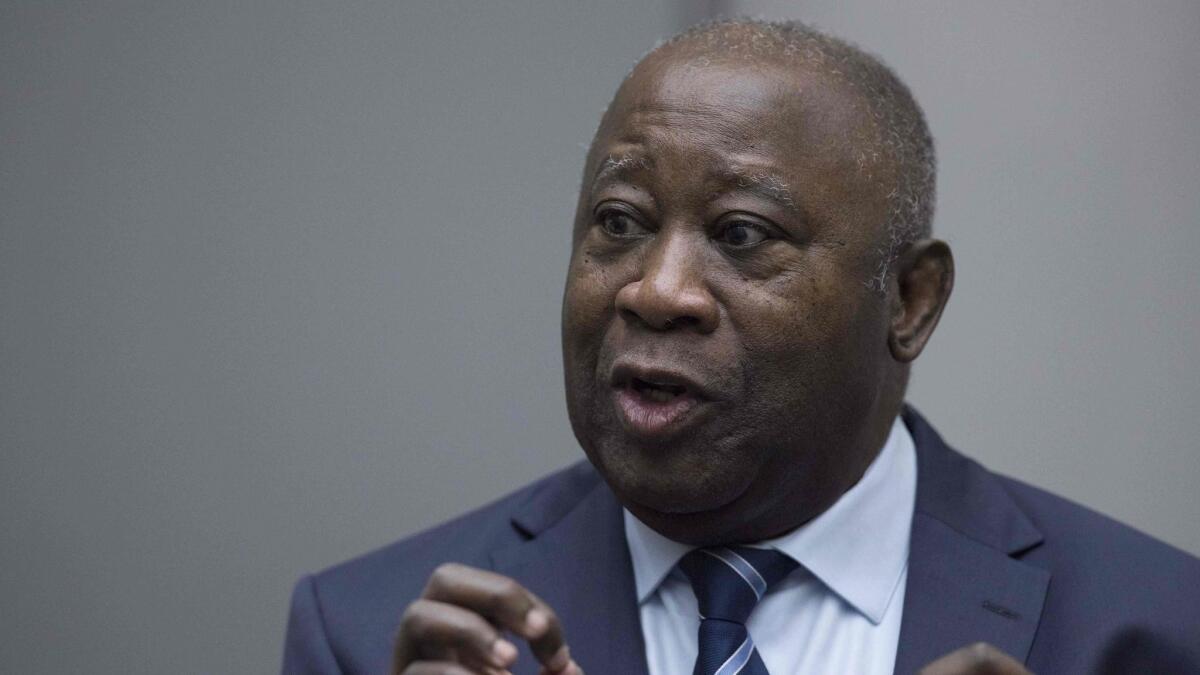Former Ivory Coast President Gbagbo is acquitted of war crimes

- Share via
Reporting from The Hague, Netherlands — Delivering a stinging defeat to prosecutors at the International Criminal Court, judges on Tuesday acquitted former Ivory Coast President Laurent Gbagbo and former youth minister Charles Ble Goude of responsibility for crimes committed following disputed elections in 2010, saying the prosecution failed to prove its case.
Presiding Judge Cuno Tarfusser ordered the immediate release of the 73-year-old Gbagbo and 47-year-old Ble Goude following the judgment, which came before their lawyers even presented a case. Tarfusser later suspended that order ahead of a followup hearing Wednesday.
Prosecutors can appeal. In a written statement, they called the ruling “disappointing and unexpected” and said they would analyze the written decision when it was published “and assess the appropriate next steps.”
Gbagbo was the first former president to go on trial at the global court, and his case was seen as a milestone in efforts to bring to justice even the highest-ranking leaders accused of atrocities.
More than 3,000 people were killed after Gbagbo refused to accept defeat by his rival and current Ivory Coast president, Alassane Ouattara.
Tarfusser said a majority of the three-judge trial panel ruled that “the prosecutor has failed to satisfy the burden of proof” against both men.
He said it was a matter of public record that Ivory Coast was wracked by post-election violence in 2010 and early 2011, but he said prosecutors did not present evidence that Gbagbo and Ble Goude formulated a plan for their supporters to unleash violence to keep Gbagbo in power. Prosecutors also failed to prove that speeches by both men incited violence, Tarfusser said.
Neither Gbagbo nor Ble Goude spoke in court. Gbagbo’s lawyer Emmanuel Altit called it a victory for justice.
“It’s also a victory for a man who was wrongly accused, President Gbagbo,” Altit told reporters. Both men are expected to return to Ivory Coast, although it remains unclear when that will be possible.
Rights groups lamented the ruling’s effect on victims.
“The acquittal of Gbagbo and Ble Goude is a crushing disappointment to victims of post-election violence” in Ivory Coast, said Marie-Evelyne Petrus Barry, Amnesty International’s West and Central Africa director.
Karim Traore, 36, is one of those victims.
“I lost my arm in 2011 because of pro-Gbagbo forces,” he said. “We do not understand the decision of the International Criminal Court to release the former president. We, the victims, have not been heard and it is a real shame.”
Amal Nassar, who represents the International Federation for Human Rights, called on prosecutors to appeal.
“The ICC as a whole should learn from its difficulties in convicting [former] political leaders bearing the highest responsibility in the perpetration of crimes and revise adequately its policy,” Nassar said in a statement.
As Tarfusser announced the acquittals, supporters of Gbagbo and Ble Goude stood and cheered in the courtroom’s gallery. Even before the hearing started, dozens of supporters sang and danced outside the court’s headquarters.
In Ivory Coast, there was an outburst of joy and relief in the Abidjan neighborhood of Yopougon, a Gbagbo stronghold. “Above all, we wish to reach out to our executioners of yesterday to make a sincere reconciliation,” said Ferdinand Zahibo, a central committee member of Gbagbo’s Ivorian Popular Front party. The government did not immediately comment.
Both defendants had pleaded not guilty to four charges of crimes against humanity including murder, rape and persecution.
The ruling was the latest defeat for prosecutors at the world’s first global war crimes court.
The case against Kenyan President Uhuru Kenyatta, who also was accused of involvement — before he became president — in post-election violence in his country, collapsed in December 2014. Last year a former Congolese vice president, Jean-Pierre Bemba, was acquitted on appeal of crimes allegedly committed by his militia in neighboring Central African Republic.
James A. Goldstone, executive director of the Open Society Justice Initiative, said the acquittal ruling “underscores how important it is that the process to select the next prosecutor yields a person of integrity and sound judgment who is highly skilled at criminal investigation.”
The term of current chief prosecutor Fatou Bensouda expires in 2021.
Gbagbo has been in the court’s custody since November 2011 and Ble Goude since March 2014.
A former university professor who founded an opposition party well before Ivory Coast embraced democracy, Gbagbo spent much of the 1980s in exile in France. After returning to Ivory Coast, he lost the 1990 presidential vote and spent six months in jail in 1992 for his role in student protests.
He came to power in 2000 in a flawed election. In the 2010 race, Gbagbo placed first in the first round with 38% of the vote before losing to Ouattara in a runoff.
Ouattara last year granted amnesty to 800 prisoners prosecuted for crimes connected to the 2010 post-election crisis, including Gbagbo’s wife, Simone, who also has been indicted by the ICC for crimes against humanity. Ivory Coast has refused to send her to the Hague. Fresh elections are scheduled in Ivory Coast next year.
“We are very happy, we are heading toward a genuine national reconciliation and we are only waiting for their return to bring about peace,” said Assoa Adou, the secretary general of Gbagbo’s party.
More to Read
Sign up for Essential California
The most important California stories and recommendations in your inbox every morning.
You may occasionally receive promotional content from the Los Angeles Times.










